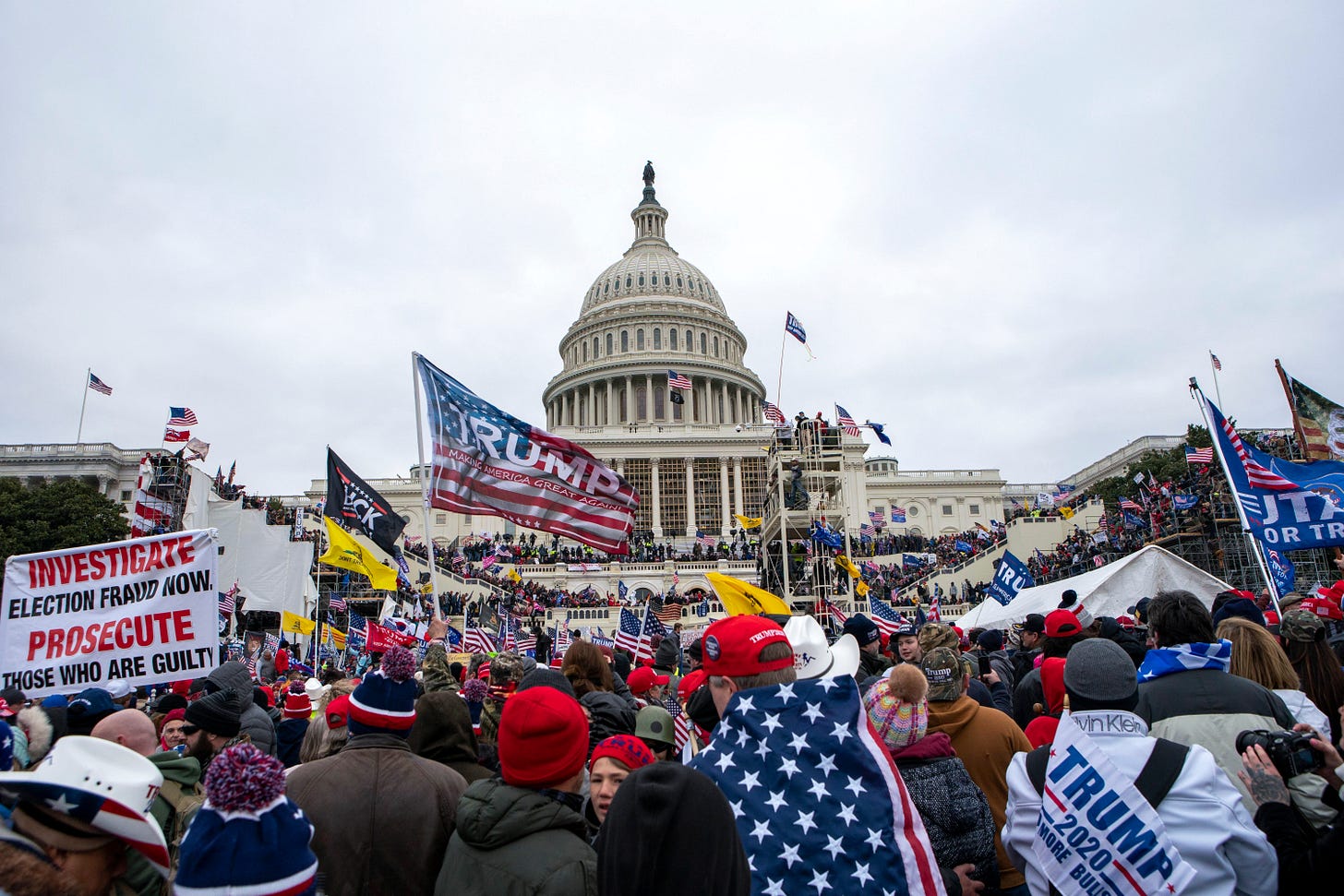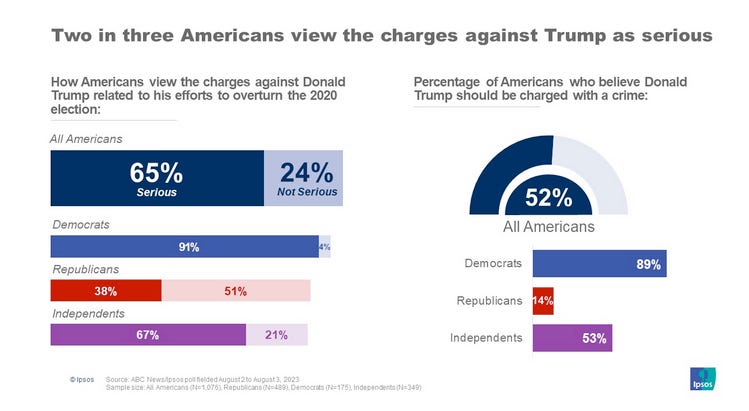Can Trump Even Run for Anything Now?
Many people are finally noticing the once widely ignored "disqualification clause" in the Constitution. The question is whether Trump should be on the ballot before or after conviction.
Alayah Hamm | a Learn4Life CLMI Fellow
The expectation that former president Donald Trump will not only run for that office again in 2024, but that he will definitely be the next Republican nominee, is sparking intense debate and conversation. After centuries of being forgotten, that dialogue is now centering around activation of what’s known as “14.3” in some circles or more precisely Section 3 of the 14th Amendment in the U.S. Constitution. It’s just a paragraph, let’s make a quick read out of it …
No person shall be a Senator or Representative in Congress, or elector of President and Vice-President, or hold any office, civil or military, under the United States, or under any State, who, having previously taken an oath, as a member of Congress, or as an officer of the United States, or as a member of any State legislature, or as an executive or judicial officer of any State, to support the Constitution of the United States, shall have engaged in insurrection or rebellion against the same, or given aid or comfort to the enemies thereof. But Congress may by a vote of two-thirds of each House, remove such disability.
It will be 153 years since the 14th Amendment has been passed and 155 years since its ratification, and on September 17th it will be 236 years since the Constitution established the government of the United States. The 14th Amendment was adopted during Reconstruction in the wake of the Civil War on July 9, 1868, addressing several important issues granting citizenship to formerly enslaved Black people, due process, and equal protection.
Section 3 was in direct response to the circumstances which led to one of the most destructive wars in history, and certainly U.S. history, a conflict of nearly 1.5 million casualties. Men who held office in the South led that insurrection and rebellion against the federal government at that time, which triggered that scale of destruction. Public and elected officials in the South who fought for the Confederacy or swore allegiance to it were regularly removed from office via the “Insurrectionist Disqualification Clause,” as Free Speech for People notes …
During the Reconstruction years immediately after the passage of the Fourteenth Amendment, states, Congress, and the U.S. Department of Justice routinely applied the Insurrectionist Disqualification Clause to people who had not been convicted of any crime. For example, in Worthy v. Barrett, 63 N.C. 199 (1869), a board of county commissioners determined that a sheriff who had served as sheriff under the Confederacy (but was never charged with any crime) was disqualified under Section Three. This was the rule, not the exception, as the vast majority of Confederate officials were never charged with crimes.
Some have been arguing for a while - even before recent indictments - that Trump should not be allowed (because of a pattern of corrupt conduct leading up to and including the insurrection against Congress on January 6th) to run for any office, especially, the presidency, ever again. This argument gets stronger since he’s already been indicted. Others do believe that his actions contributing to the January 6th Capitol attack disqualify him right now. It’s simply a question of activation and enforcement.
There’s always been debate since his election in 2016 as to whether Trump was ever fit for elected office. This particular clash, however, focuses on two issues: 1) how a growing record of misconduct and piling indictments against him can be considered a threatening action (“insurrection or rebellion”) against the United States, and 2) if the above is the case, when does the disqualification take effect? What’s the timing for it?
Consensus on the Crime
Public opinion, by a slim majority, definitely views insurrection as a serious crime, especially in the context of the January 6th attack. Critics argue that Trump's role inciting the attack constitutes engagement in insurrection. They point to his speech and false claims about the election as violence that encouraged Trump's supporters to breach Capitol security …
Most now believe he should be charged with a crime.
The expert legal scholarship on activation of 14.3 is growing and increasingly hard to refute. Harvard’s Laurence Tribe recently argued on CNN and in The Atlantic magazine that the Constitution couldn’t be any clearer with respect to the case of Trump’s involvement in an insurrection and rebellion, aside from the criminal indictments that have been lodged against him recently …
When he said he was going to pardon the ones who breached the Capitol and who had Confederate flags in there and caused mayhem and even death, that sure sounds like giving aid or comfort to the enemies of the Constitution.
Even conservative legal scholars - who one might presume would side with Trump - are arguing that 14.3 is already in effect and should prevent him from holding office, as the Huffington Post reports on law professors William Baude of the University of Chicago and Michael Stokes Paulsen of the University of St. Thomas offering arguments in a recent law review article …
“This was undoubtedly a serious assault on the American constitutional order. Not since the Civil War has there been so serious a threat to the foundations of the American constitutional republic,” Baude and Paulsen wrote. The professors explored the provision at length, parsing whether Trump violated it, and how it could be applied and enforced. They concluded that Section Three is “legally self-executing” and its “disqualification, where triggered, just is.” As far as enforcement, the authors determined that it “may and must be followed — applied, honored, obeyed, enforced, carried out — by anyone whose job it is to figure out whether someone is legally qualified to office.”
This could include state election officials, state legislatures and governors, Congress, the White House and state and federal judges.
“The bottom line is that Donald Trump both ‘engaged in’ ‘insurrection or rebellion’ and gave ‘aid or comfort’ to others engaging in such conduct, within the original meaning of those terms as employed in Section 3 of the 14th Amendment.”
Before or After Conviction?
The question on whether trump should be able to hold office in consideration of alleged violations of the 14.3 Amendment is complex and contentious. This discussion involves a number of legal issues and ethical considerations, with differing opinions.
There is growing scholarly and public consensus that he did, indeed, commit crimes of a nature that threatens the United States government. Cases in federal court over 1) the theft, hiding and mishandling of classified material and 2) efforts to illegally obstruct and overturn the results of the 2020 election, along with 3) charges in a state court over conspiracy to overturn election results all point in the direction of insurrection even if they do not explicit mention it. But the larger question remains: Do we need to wait for conviction before activating 14.3?
Public opinion and legal scholars would say “no,” to that and point to clear actions on the part of the former president, as well as a mountain of criminal indictments focused primarily on overturning the election. The overturning of a legitimate election is a form of rebellion against a legal process. Hence, why is Trump allowed to run again, why will his name be allowed on a ballot? It presents a thorny set of questions. But previous uses of 14.3 didn’t wait for criminal conviction. And what is the use of a provision like 14.3 if you can’t enforce it in the moment to prevent what it was designed against? Waiting for or till after conviction, some argue, defeats the purpose and could encourage more insurrection. By that time, the rebellion has already been waged and, tragically, successful.




